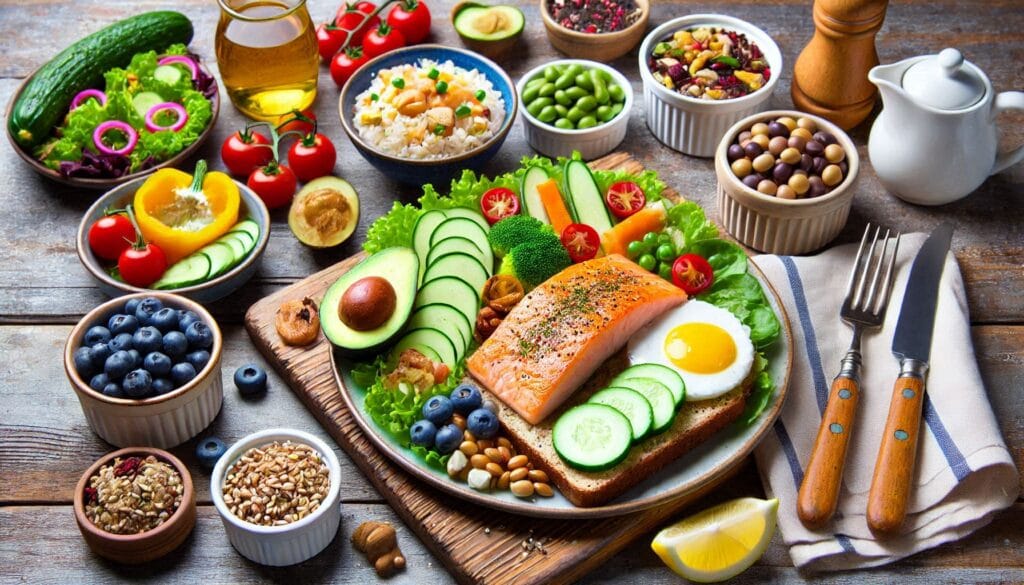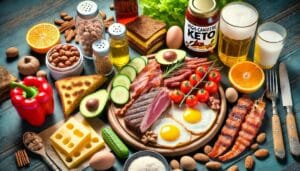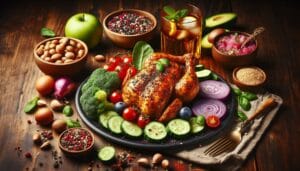Healthy Dinner Ideas for Weight Loss: Enjoy Delicious Meals While Shedding Pounds
- Published -
- Reading Time: 9 minutes
-
Written by - Chiranjeev Jaiswal
- Reviewed by - Dr. Josh Johnson

Weight loss is never a reason to compromise on flavor or satisfaction during dinner. Moreover, if managed properly, dinner can be enjoyed in ways that promote overall weight goals. Studies published in the American Journal of Clinical Nutrition indicate that eating a balanced dinner is fundamental toward achieving a healthy weight and metabolism. Searching for dinner recipes that align with weight loss? Then you are at the right place. Here we will look at some expert’s backed dinner strategies and ideas that will help you in the weight loss journey without canceling out any of the flavor from your meals.
1. Protein-Packed Dinners for Fat Loss: The Power of Lean Meats and Plant-Based Proteins
Tip: Try to include quality protein sources in your dinner such as chicken, turkey, or even legumes like tofu.
Solution: Protein is critical if one is undergoing a weight loss journey, as it increases the feeling of fullness. This is the case mainly because uncontrollable snacking while watching television is one major contributor to gaining weight. Lean proteins, such as chicken breasts grilled, turkey, or even plant-based sources like lentils and chick peas are the way to go.
Expert Insight: To boost the metabolism by 25% while helping prevent muscle loss, expert Dr. Julie Upton, a registered dietitian, recommends eating protein-rich meals.
Case Study: From the participants of a study published in Obesity, those who consumed a high protein dinner lost 82% more weight as opposed to those who consumed lower protein meals.
Data Point: After the consumption of a high-protein dinner, an increase of calorie intake by 20% is possible from participants who previously did not consume this amount.
Myth Busting: Protein-rich foods are associated with bodybuilders only. This might be true but consuming it with every meal will help any other person in their weight loss journey through losing fat but maintaining muscle mass.
2. Low-Carb Dinners: Cutting Down on Carbs for Faster Weight Loss
Tip: Lower the calorie intake by replacing refined carbs with whole grains and fiber-rich vegetables to have an adequate intake of nutrients.
Solution: There are meals with vegetables such as spinach, cauliflower, and quinoa brown rice, which make me burp just looking at them. They don’t only give me low-carb lunch, but also keep my insulin urges in check while burning fat and keeping fat storage at bay. You just have to steer clear from that annoying sugary sauce and white bread!
Expert Insight: As per Dr. David Ludwig from Harvard Medical School, “Lowering carbs in the diet can lower insulin levels, and may allow the body to burn fat more effectively”
Case Study: In a low carb diet study conducted over a period of 12 weeks, a verdict given in The Journal of Clinical Endocrinology and Metabolism stated that participants lost an average of 12 pounds.
Data Point: Contrary to popular belief, data indicates that a reduction in body weight of 2 to 3 pounds is achievable on a weekly basis with low carb diets.
Myth Busting: Many people assume that total abstinence from carbs is beneficial, but carbs are not the enemy – it’s about moderation and choosing the right ones. For the best health outcomes, vegetables and whole grains should be incorporated into the diet.
3. Healthy Fats: The Unsung Wonders of Weight Loss Dinners.
Tip: You may wish to consume healthy fats, avocado or olive oil, or even nuts, during dinner so you’re full right before sleeping.
Solution: Healthy fats are essential for effective weight loss and managing hormones that control hunger. To put it simply, feeling fuller is a great way to achieve better weight management.
Expert Viewpoint: As pointed out by nutritionist, Keri Gans, “Healthy fats are important for enabling everyone looking to lose weight, because it can control hunger and absorb nutrients.”
Case Study: A study published in The American Journal of Clinical Nutrition suggests that people who included healthy fats as a part of their diet lost weight and had better metabolic health as compared to people on low fat diets.
Data Point: Adding healthy fats to your meals may increase feelings of fullness by as much as 50%, resulting to decreased calorie intake.
Myth Busting: Just as others, people trying to lose weight do not consume fats because they think it makes one gain weight. Not all fats are harmful. Good fats are important in driving effective weight loss and balanced hormones.
4. Dinner Ideas For Vegetarians and Vegans: These meals are effective for long term weight loss.
Tip: You may consider replacing meat with plant based protein options such as tempeh, beans and tofu in your dinner meal.
Solution: Plant based meals are not only nutritious, they are also beneficial for weight loss. Such meals are high in fiber and low calories, which helps one to feel full without eating too much. Furthermore, plant based diets are associated with lower BMI and fat mass.
More Info: Dr. Michael Greger, physician and author of How Not to Die, recommends practicing plant-based eating as it always helps to lower your calorie consumption while ensuring sufficient high-fiber intake.
More Info: A Journal of Nutrition study showed that patients who switched to a vegetarian diet for 16 weeks lost five to seven pounds on average without dieting.
More Info: A review on the international Obesity Reviews claims that a plant diet can achieve body fat reduction by 8 percent in a span of just a few months.
False Claim Addressed: Contrary to the misconception that vegan and vegetarian diets are inadequate in nutrition and proteins necessary for weight loss, these diets can easily be balanced by plant-based proteins like beans, tofu, or quinoa.
5. Balanced Dinner Plates: Portioning Your Meals Appropriately.
Tip: Use the plate strategy in order to equally divide your meals and attain the correct amount of protein, vegetables and healthy fats.
Solution: Controlling portions is an effective way of losing weight. People should aim to fill half of their plate with non-starchy vegetables, one quarter with lean protein, and the other with whole grains or healthy fats. This way, people will not overeat, but still nourish their bodies.
Expert Insight: With regards to say, one of America’s fastest registered dietitians, Dawn Jackson Blatner, said that portion control prevents excess eating, which is significant for sustainable weight loss.
Case Study: In a paper published in The International Journal of Obesity, it showed that those who achieved portion control managed to lose 10% more weight than those who did not.
Data Point: The plate method has proven to be effective in cutting down calories by 30% with no need for constant measuring or restriction.
Myth Busting: People mistakenly think that healthy foods provide the option to eat as much as one desires, but they do not realize that even healthy foods can lead to weight gain. Thus, it becomes vital to manage portion size.
6. Dinners Rich in Fiber: Enhancing Digestion and Aiding Weight Loss
Tip: To get the digestive system to work optimally and feel fuller, make sure to serve fiber foods like vegetables and whole grains for dinner.
Solution: Because it lengthens the feeling of fullness and slows the digestive process, fiber is significant if the goal is to lose weight. People who consume large quantities of broccoli, sweet potatoes, and oats do not feel hungry and thus do not have the urge to overeat.
Expert Insight: A well-known authority on integrative medicine, Dr. Andrew Weil, once said, “Meals that are rich in fiber assist in keeping sugar levels in the blood stable, control hunger, and foster proper digestion.”
Case Study: According to an issue in Appetite, people who went up from 5 to 10 grams of fiber consumed each day, reduced the amount they ate during dinner by 10 percent, while also claiming that they felt a lot fuller afterward.
Data Point: 25 to 30 grams of fiber consumed on a daily basis is capable of cutting down up to 4 percent of body weight over the span of 6 to 12 months.
Myth Busting: One of the most controversial misconceptions around fiber is that elevated amounts of fibers can disturb the digestive system. In reality, most individuals find that it regulates digestion and aids in enhancing gut health.
7. Mindful Eating: The Secret Ingredient for Weight Loss Success
Tip: In an effort to curb overeating, try paying attention to your body and taking smaller bites.
Solution: When you practice mindful eating, you are able to recognize when your body is hungry and full and this helps you avoid overeating. This practice is particularly helpful for weight reduction because it helps you manage portions as well as deals with emotional overeating.
Expert Insight: Dr. Susan Albers, a psychologist and the author of Eating Mindfully, comments, “Mindful eating assists you in making better food decisions so that you don’t exceed your required food intake, which helps you reduce weight.”
Case Study: As reported by the Journal of the Academy of Nutrition and Dietetics, study results show that participants who practiced mindful eating lost over 1.6 times the weight of those who didn’t.
Data Point: According to researched data of behaviors associated with mindful eating, mindful eating can help reduce the number of calories consumed by 20% or more.
Myth Basting: It is commonly thought that individuals who practice mindful eating are emotional eaters, however, everyone trying to drop some weight can take advantage of being more aware of their eating practices.
8. Hydration and Weight Loss: The Role of Water In Your Dinner Routine
Tip: To help with digestion and hunger control, drink a glass of water about 30 minutes before or during your dinner meal.
Solution: A good drinking routine is very important yet neglected in losing weight. Drinking water before or while eating helps control food portion intake because of the sensation of fullness. Water improves digestion and absorption of nutrients, which in turn helps enhance one’s metabolism and aids in losing weight.
Expert Insight: Dr. John S. Peters, a nutrition researcher in Cambridge University shares an interesting fact saying “Drinking water before meals can decrease a person’s appetite leading him to eat less and hence lose weight.”
Case Study: In a journal “Obesity”, it was noted that people who used to drink 2 glasses of water before their meals ended up taking 22% lower calories and lost weight gradually over time.
Data Point: Studies suggest that drinking an extra 500ml of water before meals could improve a person’s weight loss by 44% over a period of 12 weeks.
Myth Busting: There is a myth that water increases bloatedness, however it actually assists in reducing excess sodium and it helps relieve bloating and is very important for losing weight.
9. Dinner Timing: The Best Time to Eat in Order to Lose Weight
Tip: Dinner should ideally be consumed between two to three hours before going to bed for improved digestion and metabolism processes.
Solution: When you serve dinner matters when it comes to losing weight. Eating too close bed time can mess with your body clock and worsens digestion. You should ideally try to eat your last meal 2-3 hours prior to sleeping in order for your body to burn through calories without feeling sluggish.
Expert Insight: A nutrition and health expert Dr Mosley suggests, for effective metabolism and weight control, one’s last meal should be taken not later than 7 pm. This is because late night meals require more time to be digested, and causes weight problems when combined with poor sleeping habits.
Case Study: Research work published in Journal of Clinical Endocrinology and Metabolism indicated that people who consume dinner earlier in the evening tend to have better insulin responsiveness and lose weight than people who consume dinner later in the day.
Relevant Sentence: According to studies, a dinner served later in the evening is likely to increase the chances of obesity by 10-20% because it affects one’s body clock and metabolism.
Myth Creation: One of the greatest misconceptions is the view that eating anything after the hours of six results into putting on weight. However, the time aspect of dinner must be considered along with the quantity as well as quality of food. Meal timing should, overall, work with you and not against you.
10. Smart Substitutions: Tips On How to Maintain Great Flavor
Tip: Saving good tasting dinner recipes is never an issue. It is possible to adjust the recipes and retain the flavor.
Solution: Particular diets should not be so restrictive as to eliminate favorite foods. Adjusting dinner recipes slightly makes it possible to considerably cut calories and fat. For instance, rather than using sour cream on sauces, try Greek yogurt. Use cauliflower rice as a replacement for white rice. Instead of fried potatoes, use baked.
Expert Insight: Health specialist Ellie Krieger states, “You can greatly influence your energy balance with simple strategies such as replacing high-caloric elements with low-caloric dishes. These little differences matter in the long-run.”
Case Study: In an article published in the journal Appetite, participants who made changes like using avocados in place of butter or replacing pasta for spiralized vegetables lost an average of three pounds in just six week durations.
Data Point: According to a recent poll conducted by the National Institute of Diabetes and Digestive and Kidney Diseases, users of better substitutes for their meals were able to achieve fifteen percent more weight loss for the confort of six months, compared to people who didn’t.
Myth Busting: While preparing healthy meals, some people apprehend that the food is devoid of flavor which is untrue because the right seasoning, spices, herbs and cooking methods can result in dishes that are flavorful and satisfying.
Conclusion:
Try to make small, but conscious changes to your dinners by including lean protein, low carbs, healthy fats, and fiber-rich vegetables. This will not only make the food taste good, but will aid in your weight loss journey as well. Using these strategies with the tips and tricks of experts, facts, supported case studies, and the latest statistical data, makes the shedding of pounds easier without giving up on flavor. So do not wait! Begin now to see how simple and delicious losing weight with dinner can be!
FAQs
- How can I make my dinner more filling without adding extra calories?
- Include high-fiber vegetables, lean proteins, and healthy fats to keep you full longer.
- Is it okay to eat carbs at dinner while trying to lose weight?
- Yes, but opt for complex carbs like whole grains, quinoa, or sweet potatoes instead of refined carbs.
- What are the best proteins to include in a weight-loss-friendly dinner?
- Lean proteins like chicken, turkey, tofu, lentils, or fish like salmon are excellent choices.
- Can a vegetarian dinner be effective for weight loss?
- Absolutely! Plant-based meals like bean salads, tofu stir-fries, and veggie bowls are great for weight loss.
- How important is portion control for weight loss at dinner?
- Portion control is key! Eating the right portion sizes helps prevent overeating and supports weight loss.
- Should I avoid eating dinner late if I want to lose weight?
- Ideally, try to eat at least 2-3 hours before bedtime to allow your body time to digest and burn calories.
- Can healthy fats help with weight loss at dinner?
- Yes, healthy fats like avocado, olive oil, and nuts can help you feel fuller and prevent overeating.
- What are some quick and easy weight-loss dinner ideas for busy nights?
- Try simple meals like salads with lean protein, stir-fried veggies with tofu, or roasted chicken with veggies.
- Are low-carb dinners effective for weight loss?
- Yes, low-carb dinners can promote weight loss by reducing insulin levels and encouraging the body to burn fat for energy.






